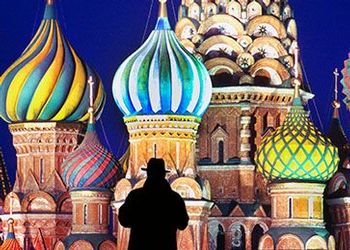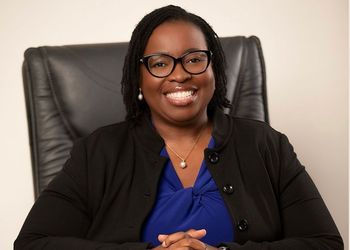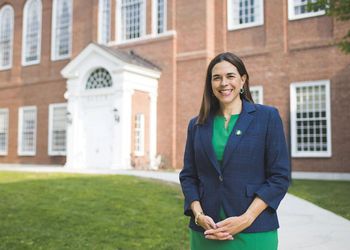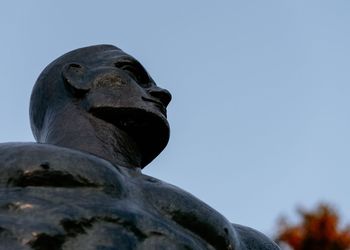The 1996 Russian Elections—A View From Langley
As a history graduate student studying politics of the Stalin era during the early 1970s, Peter Clement could hardly imagine he would someday be applying the historian's craft to the assessment of contemporary events in Russia; nor could he imagine he would be doing that at the CIA. As the chief Russia-Eurasia analyst for the Central Intelligence Agency this is his account from Langley of the 1996 Russian Elections.

By Peter Clement, M.A. '72, Ph.D. '87
Introductory Note: As a history graduate student studying politics of the Stalin era during the early 1970s, Peter Clement could hardly imagine he would someday be applying the historian's craft to the assessment of contemporary events in Russia; nor could he imagine he would be doing that at the CIA. As the chief Russia-Eurasia analyst for the Central Intelligence Agency this is his account from Langley of the 1996 Russian Elections.
Studying in Professor Robert Slusser's seminars on Soviet politics, I became mired in the examination of Communist party leader speeches and photographs of old men standing atop Lenin's tomb—all in hopes of finding small clues to help explain decision making in the Stalin and Khrushchev period. Despite the collapse of the Soviet Union, those kremlinological skills—the use of detailed chronologies, the thorough reading of the media, the uncovering of personal networks and relationships among within the political elite—remain essential to an understanding of post-Soviet Russia. As an analyst and manager in CIA's Office of Soviet Analysis (now the Office for Russia-Eurasian Analysis), I tracked Soviet and Russian politics for some 19 years. Nothing, however, compares to Russia's roller-coaster drama since the demise of the Soviet Union.
We at CIA all agreed that the June-July 1996 Presidential election was a critical crossroad that would significantly influence Russia's future path; that said, we also knew there have been many seeming 'crossroads' in Russia that have preoccupied U.S. policymakers since 1992:
- the Supreme Soviet's nearly successful effort to impeach Yeltsin in February 1993
- Yeltsin's 'vote of confidence' referendum in April 1993 and the subsequent power struggle with the Supreme Soviet that culminated in the October 1993 shelling of the Parliament by government forces
- Russia's first fully democratic legislative elections in December 1993—concurrent with a nationwide referendum on a new post-Soviet Constitution; Russia's December 1994 military intervention into the breakaway republic of Chechnya
- Boris Yeltsin's two heart episodes in July and October 1995
- the 1995 legislative elections in which the Communists garnered some 32 percent of the party list votes for the lower house (Duma)
Yeltsin and Communist leader Zyuganov offer two very different visions of Russia: Yeltsin offers continuation of Russia's rocky transition to a market economy, toward a society in which individuals increasingly have to assume responsibility for their destiny. Zyuganov wants to insure a greater state hand in meeting people's basic needs, with an economic platform that sounds suspiciously like a Soviet blueprint from the past.
Rather than write an analysis of the implications of the Russian election, I thought it might be more interesting to provide a glimpse (unclassified, of course) of CIA's analytical team at work—as events unfolded in June-July. The following diary from CIA headquarters in Langley, Virginia, is a selected record of my thoughts and observations during Russia's two-round election for President during June-July 1996.
According to Russian law, the absence of a majority for any single candidate in round one (June 16) will necessitate a second-round runoff between the two top vote-getters in round one.
Thursday, June 13: There is great uncertainty in Moscow about the likely outcome of the 16 June first round; since mid-May, polls published in the Russian press have run the gamut; some show Yeltsin with a comfortable lead, others point to a surprising Zyuganov victory, stemming from the 'silent support' of Russians in small towns and the hinterlands. Western media, meanwhile, note the unreliability of such polling, given Russia's limited experience with polling techniques. Our view is that Yeltsin has successfully turned the election into a referendum on Communism: Do voters want to return to the past? Or continue down the road of change and reform—admittedly one which has brought hardships and pain to many Russians? Given the advantages of the Presidency (in terms of media coverage, patronage, etc.) as well as Yeltsin's remarkably active campaigning across the country, we feel Yeltsin will likely lead the field of 11 presidential candidates in round one.
Sunday, June 16: Early returns show BNY (Boris Nikolayevich Yeltsin) ahead, 33-30 percent...Some assume lead will grow as Moscow/Central returns come in--11 time zones, long counting–but in end, it is BNY at 35-32. Zyuganov's solid showing is consistent with Communist vote in December's parliamentary election: Communists and their allies totaled some 32 percent of the vote. The populist-minded, maverick General Lebed came in a strong third, at 14.5 percent, leading many observers to dub him the 'kingmaker.' Lebed makes no secret of his anti-communist outlook--but his strong nationalism, past criticism of President Yeltsin, and his knack for controversial quotes makes him a wild card. In sum, the first round was hardly comfort for Yeltsin's reelection team. Several obvious issues stand out: Can the Communists draw enough voters beyond their natural constituency- -pensioners, old citizens, disgruntled Russians--to gain a plurality in round two? Who will successfully woo the 'next three' candidates: Lebed, reform-minded economist Grigoriy Yavlinskiy (7 percent), and ultranationalist Vladimir Zhirinovskiy (6 percent) to build that plurality? More importantly, in the absence of strong parties, can any of these second tier candidates really 'deliver' their voters to Yeltsin or Zyuganov? In short, it appears we have a 'free for all' in the next few weeks, one which insures we will be very busy. The date of the second has yet to be determined. According to Russia's electoral law, it must occur within two weeks of the release of the official first round results. Thus, we assume it probably will be 7 or 14 July, as all elections thus far in post-Soviet Russia have been on Sundays.
Monday, June 17: In thinking about BNY's narrow first-round lead, we all agree there remains a potential risk that hard-line advisers around BNY are scared, and will urge him to forego second round--can't take the chance. One of those advisers, Aleksandr Korzhakov (Yeltsin's chief bodyguard and head of the powerful Presidential Security Service, which one Russian newspaper said was 40,000 strong) told reporters just last month that he thought Russia should forego elections, given the polarized political scene. Yeltsin's oft-stated remark about 'not turning power over to communists' is not reassuring in this regard. Yet, at same time, Yeltsin himself exhibits little doubt about holding a second round: he met with Lebed today, raising speculation of a pending election 'deal.'
Tuesday, June 18: at morning press conference, BNY, with Lebed at his side, announces the general is now his National Security Adviser, head of the Security Council, and a full cabinet member. A breathtaking turn of events, one with significant implications for the byzantine, treacherous politics of Yeltsin's inner circle. There were indications this deal was cooked BEFORE the 16 June voting; several analysts had observed last week that Lebed was getting a lot of favorable coverage on Russian television.
ON WEDNESDAY, A BIZARRE ARREST OCCURRED...TWO YELTSIN CAMPAIGN OFFICIALS WERE APPREHENDED LEAVING PARLIAMENT WITH $500,000 IN FOREIGN CURRENCY. PUULE: WHY WAS THE EVENT COVERED LIVE ON TV?
WEDNESDAY, JUNE 19: As I prepare to leave at 7:30 PM, an analyst tells me of a bizarre arrest that occurred a few hours earlier in Moscow; Russian TV interrupted its late-night programming with unusual live coverage of the arrest of two Yeltsin campaign officials; they were apprehended leaving parliament with a box allegedly containing $500,000 in foreign currency. They were apprehended by security forces reporting to Korzhakov and Mikhail Barsukov (Head of the Federal Security service). Naturally, one might wonder why loyal Yeltsin appointees officials would choose this particular moment to publicize the involvement of Yeltsin campaign officials in illegal financial activities. We all recognize this anomaly means something very big is afoot...I call in several analysts to work through the night... don't want us to miss any major developments.
(NB: Because Moscow is ahead of Eastern Daylight Time (EDT) by eight hours, we go to 24-hour coverage during critical periods in Russia. This insures that CIA briefers who meet with the President, Vice-President, and other senior US officials early every morning are up to the minute; our daily written analyses-The President's Daily Brief and National Intelligence Daily-go to the printers several hours before the briefings occur.)
THURSDAY, JUNE 20: At 5:00 A.M. EDT, a dynamite announcement-Yeltsin has sacked Korzhakov, Barsukov and Deputy Prime Minister Soskovets. Korzhakov, touted by many as a modern-day Rasputin, has been Yeltsin's erstwhile personal bodyguard since 1988; drinking partner, and, by Yeltsin's own accounting, a close and trusted personal friend. This decision could not have been easy for Yeltsin; indeed, he appeared pained as he slowly read off his statement of the dismissals. A pro-reform Yeltsin adviser, Chubays held a major 45-minute press conference, depicting the swift moves against Korzhakov, Barsukov, and Soskovets-hardliners seen by most as the chief advocates of the Chechen intervention and opponents of holding elections-as a critical victory for democracy in Russia. Chubays also described Lebed as the "hero;' having agreed to initiate these moves and urging Yeltsin to take these measures. Another important event today: the government announced that the second round will be held on 3 July,a Wednesday. There has been much speculation about the date; some commentators have expressed concern that a Sunday vote, especially in mid-July, would hurt Yeltsin, as many people will be at their country dachas or on vacation. Zyuganov, after some initial Communist rumblings, expressed his approval of the 3 July date.
FRIDAY-SUNDAY, JUNE 21-23: Like others, we are busily analyzing the full implications of the week's events. While Yeltsin's decision to sack Korzhakov et al. did represent an important victory for pro-reform forces, it did not necessarily diminish the potential for byzantine politics in the leadership. The meteoric rise of General Lebed put a politically inexperienced military officer close to the Presidency and raised questions about Chernomyrdin's prospects as heir apparent to Yeltsin. Lebed's success in getting Defense Minister Grachev removed also raised concerns in the military about a possible purge of senior military officers.
MONDAY-WEDNESDAY, JUNE 24-26: Things appear to have quieted down-weekend polls published in Russian media show Yeltsin with a 53-30 lead; Yeltsin is busy campaigning, with a visit to Kaliningrad, Yekaterinburg...one can almost detect an air of complacency-BNY has done all the right things: brought Lebed on board, made overtures to Yavlinskiy, and his TV ads start to take a sharper edge, with footage of the Stalin era grimly reminding voters of past Communist evils. Still, I have an uneasy feeling...I've seen this mood before... given the "perils of Pauline" routine I have witnessed time and again during the past 5 years, I can't contain my suspicions that somehow other developments will complicate the 3 July scheduled second round of voting.
THURSDAY, JUNE 27: Several analysts detect something odd on Russian television. The news shows a clip of BNY meeting with former Duma speaker Rybkin–nothing unusual there-but in a subsequent televised interview, Rybkin appears strangely different: His hair is shorter (sideburns in particular) and his tie appears to be different than the one Rybkin wore in his session with Yeltsin. Now, you must understand, we Russia (former Soviet) analysts are suspicious by nature-the Soviet-era doctoring of photographs is still etched in our memories! Indeed, the Yeltsin era has its share of "disingenuous" media coverage. Just last year, in July, old footage was screened to persuade viewers that Yeltsin's heart problem wasn't sufficient to keep him out of the office. Now again, on the eve of the Presidential election, we were able to match the Rybkin meeting footage with file footage from October 1995. Obviously, this was a serious issue: Why are Yeltsin's handlers trying to convey an erroneous picture of Yeltsin's activities? Has he fallen ill? Now??
FRIDAY, JUNE 28: The "Yeltsin watch" is on again. Now, we are avidly micro-analyzing every snippet of Russian media coverage, for any indicators, clues of Yeltsin’s whereabouts, activities, or other “kremlinological" clues that something is amiss. One thing becomes clear: Yeltsin has missed several scheduled "election events"- meetings with farmers, youth groups and, more ominously, his spokesman acknowledges the President is sidelined with a "sore throat." Finally, as though to reassure voters, TV airs a short clip of BNY meeting with his closest advisers, Ilyushin, Satarov, and daughter Tatianna. BNY looks stiff, wooden, at end of small conference table.
JUNE 29-30: The is last weekend before the 3 July (Wednesday) second round. Yeltsin should be out on the hustings—but instead, Russians are informed of his reduced work schedule–2 to 3 hours a day. Of greater concern, Yeltsin appears infrequently on television-in contrast to the entire campaign up until now; he is shown meeting with his close adviser, Viktor Ilyushin. However, contrary to press rumors, Yeltsin does not meet with several former Presidential candidates–reform-minded Grigoriy Yavlinskiy and eye surgeon Fedorov–whose votes he must gain to ensure a solid victory over Zyuganov. BNY's health is hardly mentioned in the Russian media-but it has caught the Communists' attention. Challenger Zyuganov tells listeners he said all along BNY was very sick... and he demands a medical commission be formed to assess the condition of "top officials." Lebed, meanwhile, publicly calls for re-establishment of the position of Vice-President (which he of course would fill); this too causes some concern for us–does Lebed know something about Yeltsin's health? Is the call for the Vice-Presidency a blatant move in the "succession sweepstakes"? Taken together, one gets the odd feeling of a succession struggle developing, despite the fact that an election is just 3 days away.
MONDAY, 1 JULY: Our political "antennae" are high-something doesn't feel right. Yeltsin does make a few appearances: first, a short, prepared statement, his final message to the Russian people, urging all voters to turn out, as every vote is "decisive." (He is right-Russian pollsters all agree a high turnout favors BNY, because it means more young, newly-wealthy voters are voting; low turnout means the tried/ true communist voters are dominating, as their voting patterns are consistent-they always turn out.) We also are treated to two other appearances: a meeting with Chernomyrdin–recently returned from the G-7 summit in Lyon, France; and a brief session with Lebed. Overall, a good day, but we still are wary. Yes, Yeltsin did look better in the taped speech; at the same time, he did NOT make a big public address, as he did on the eve of the first round voting; moreover, his only meetings are totally controlled. They are with trusted advisers-and Lebed, i.e., people with no incentive to disclose evidence of possible Presidential infirmity. In short, the trusted circle. Tomorrow is the day before the election. I hope all goes well...no more surprises...but again, I confess, I wouldn't be surprised by a 3:00 AM phone call from the Operations Center–I've had my share of those in recent years.
TUESDAY, JULY 2: Another late night-our last pre-election analytical piece for the PDB, NID...we brief the CIA Deputy Director and the Deputy Director for Intelligence on our last take...we project Yeltsin will win-though the margin of victory may not be as big as some pollsters are saying... This is it. .. the last day...the election prohibits last day campaigning by either candidate ...so, we face the calm before the possible storm... BNY reportedly will make a public appearance tomorrow to cast his ballot at the local polling place in Moscow where senior officials live... we will watch closely ... issue now is how the votes will go. Will questions of BNY's health, longevity, affect Russian voters?? Western media suggest most rural Russians unaware, not sensitive to health issue-Russian media barely mentioned it... still, if some Yeltsin voters get doubts, and decide not to show up, low turnout could harm BNY, in what most pollsters in media are calling a close race.
As for me, I am already thinking ahead: I believe Yeltsin will win...but the situation is far different than just 2 weeks ago. I am already looking ahead to the second term, and how Yeltsin will lead Russia. Can he really continue, given his numerous health problems, for a full 4 year term? In the past, his periods of inactivity led to decision making problems and political maneuvering by competing groups in the Kremlin...will this continue to be a problem? And who will be selected to fill the security and defense portfolios in a new cabinet? Will other current ministers be removed? A key factor will be Yeltsin's choice of Prime Minister, since that person, according to the Constitution, becomes acting President for 3 months in the event the President is incapacitated or dies. Another element to factor in is General Lebed: He already has stated his desire to re-establish VP slot (would require constitutional amendment) How would a Lebed presidency affect Russia's "democracy building" and foreign policy?
WEDNESDAY, 3 JULY: FINALLY...the big event we have anticipated for a year...I recall just 6 months ago, we questioned BNY's staying power: his media poll numbers were at 5 percent...he was mired in the Chechen war... recovering from 2nd heart episode in 5 month period...we worried whether he could really win the election, given he would have to engage in much travel, campaigning, in order to exploit his main asset–personality and charisma. Yet, here we are. The first news item on Russian TV shows Yeltsin voting at the polling station near his dacha (not the downtown site reporters had expected) Yeltsin looked OK...but walked slowly, and seemed to respond slowly at first when asked questions by a reporter. Still, he did appear in public...he walked (rather than just sitting stiff behind a table, his usual pose in past 6 days).
The first official numbers come in...with 5 percent of vote, Y leads, 51 to 41 percent over Zyuganov; by late afternoon, with 60 percent of vote in, Y opens up a bigger lead, at 55-40. As we leave the office that night, it appears Yeltsin has things wrapped up. Only question is the margin of victory.
WE RUSSIA ANALYSTS ARE SUSPICIOUS BY NATURE. THE SOVIET-ERA DOCTORING OF PHOTOGRAPHS IS STILL ETCHED IN OUR MEMORIES
THURSDAY, 4 JULY: The night shift analysts have prepared data, other reporting for use in our scheduled 8:00 a.m. teleconference with Deputy Secretary of State Strobe Talbott and senior officials from the National Security Council. They will help draft President Clinton's comments on Russian election, to be delivered later that morning to the press.
Meanwhile, with the vote still being counted, there are numerous signs of continued political maneuvering in the Kremlin. Russian television, for example, carried footage of Yeltsin greeting Chernomyrdin, Moscow Mayor Luzhkov, and members of his election "strategy team"–but nowhere was Lebed to be seen. Yeltsin quickly ended any possible suspense concerning his choice for Prime Minister (according to the election law, the cabinet must resign after an election) by naming Chernomyrdin; Parliamentary approval must occur within 2 weeks of the President's inauguration (now slated for 9 August).
Equally intriguing were comments made by Chernomyrdin later in the day: He pointedly dismissed the notion of re-establishing the vice-presidency, calling it unnecessary–and also took a swipe at Lebed by stating he, Chernomyrdin, had no intentions of surrendering powers to anyone (a few days earlier, Lebed had publicly cited the need to broaden his authorities in to the economic policy realm).
Although Yeltsin has won the election, the specter of renewed health problems resurrects the succession issue that has been hovering in the background for some time. One thing is certain: The coming months/years will continue to keep us busy. One can never rule out Yeltsin's staying power, as we learned in this election. At the same time, his activity pattern over the past year suggests there will continue to be "ups and downs" that correlate with his health problems. It's those "down" periods that will give us headaches–especially when trying to sort out decision-making in the Kremlin. Our difficulties will be further complicated by the political/succession maneuvering that is likely to intensify if Yeltsin's health appears to be in decline.
End note: Yelstin would resign early in 1999 and appointed Vladimir Putin prime minister. It was a clear sign that President Yeltsin was preparing Mr. Putin for the Kremlin.
PETER CLEMENT, M.A. '72, PH.D. '87, is the former director of the Office of Russian and Eurasian Analysis at the Central Intelligence Agency, Langley, VA. He has published extensively on Soviet foreign policy, Russian politics, and politics in Central Asia. He is currently the Senior Research Scholar/Adjunct Professor at the Saltzman Institute of War and Peace Studies in the School of International and Public Affairs at Columbia University.
Contributing Writer(s): PETER CLEMENT, M.A. '72, PH.D. '87



